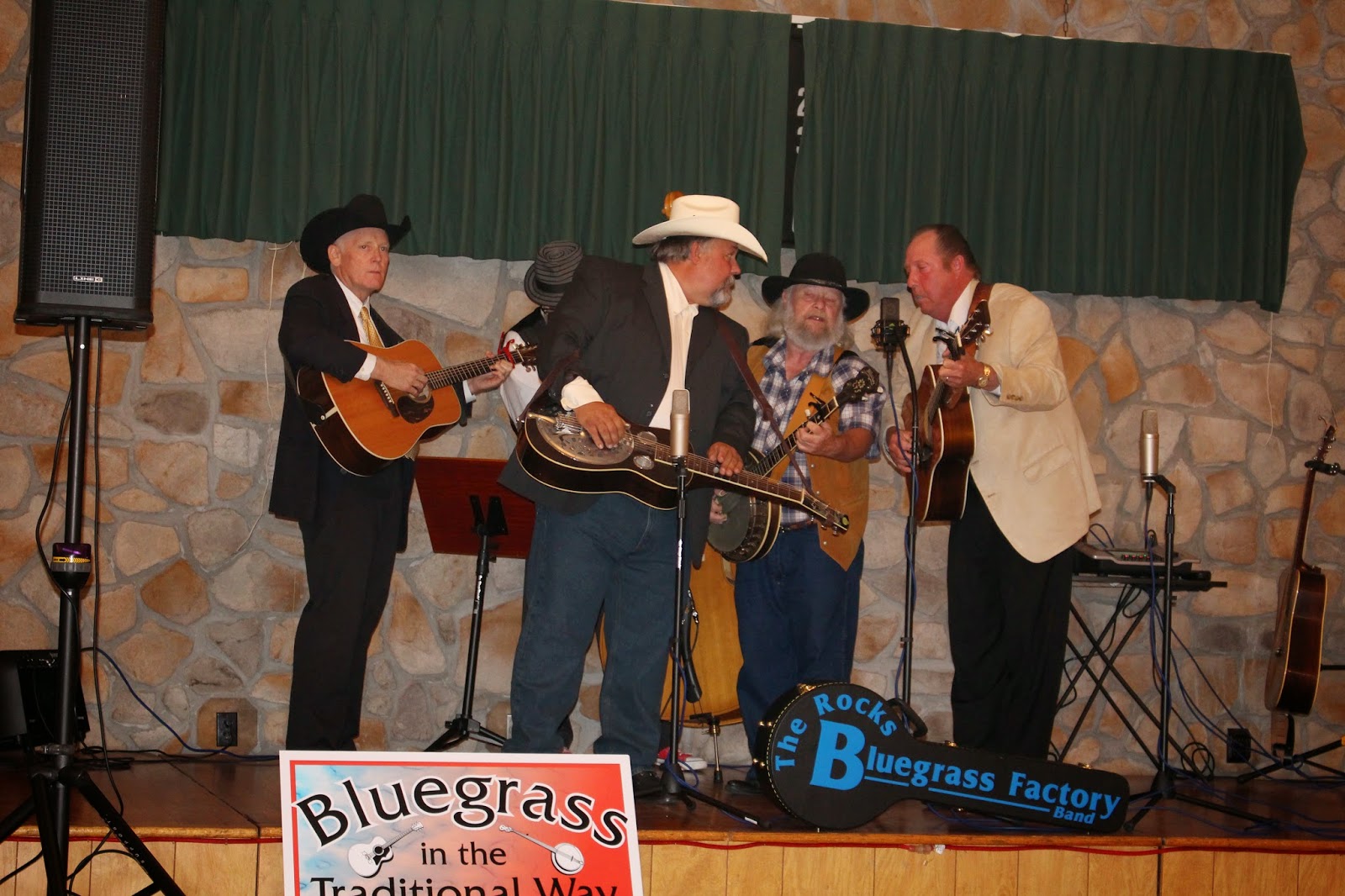Roger Eberlin, Tom Cook, Ray Horst, and John Hilton. (Ron McVey is out of camera range)
15 June 2014: Fathers' Day
I don't know how I get myself in these fixes. Well, yeah, I do. I'm having too much fun in life. Last night I came home (again) from Jumbo Jimmy's Crab Shack in Port Deposit, Maryland. Fortunately, the weekend traffic on I-95 South was light and I could take my time composing my thoughts. On Saturday night Connie and I went out to (Rob Miller's Barn) in Westminster, Maryland to see Fastest Grass Alive. I should have been working on a piece I'm writing for Marv Ashby and High Octane, but I was way behind. I'll get to the Marv Ashby piece sooner or later. Right now I'm having too much fun. It's nice to be on a roll of having fun with bluegrass. I put Rob's Barn in parenthesis because it's nearly a well-kept secret. Rob Miller and his Committee of volunteers have only recently established a nice web-site and other public connections so they can at least let the Traditional Bluegrass cognoscenti know how to get to this obscure location. Before a few months ago everything was being handled through a massive e-mail list, which is tedious and antiquated. Here's the well-kept secret: Rob's Barn is establishing an operating record of getting, lining up, acquiring, some of the best working bluegrass bands in Maryland, Virginia, and Pennsylvania. What I like about the place is, it's strictly for listening and enjoying the music and everyone who goes there is on the same page about that. It's also staying traditional bluegrass only - no funny stuff. The form will be honored and respected by the best traditional bluegrass players you'll find in Maryland and beyond.
The Saturday night performance with Warren Blair, Kenny Blair, Steve Streett, Dave Robertson, and Scott Walker was so outstanding that I knew I would have to write it up eventually. Fastest Grass Alive has nearly a legendary reputation among those regularly working the Maryland bluegrass venues. But here I am in a jam. I still owe Marv Ashby some credit. So, being the hopeless addict I am, I got some sleep until 10:00 am on Father's day and then headed out to Jumbo Jimmy's to catch "Chestnut Ridge." For the past several days I've been checking every internet source and calling friends to see if I might find out anything I could on Chestnut Ridge. "Nope, never heard of them" was the response I was getting. There were lots of bands called Chestnut Ridge but none of them matched what I was looking for. Nothing on You Tube, either. Sometimes in my line of having fun I love the total crapshoot. Take the big chance and be totally disappointed or be pleasantly surprised. After all, isn't that what the entertainment business is all about? I had one connection: John Hilton, who plays banjo. It ends up I had been friends with him on Face Book all along and had never met him. I put two and two together. People castigate Face Book for it's superficiality. I would be dead in the water for bluegrass connections and band schedules if I weren't on it. I walked into Jumbo Jimmy's and a few minutes later John Hilton walked in the door. Bingo. We were finally introduced. And he's a good banjo-player by the way. That's the important part of the story. Pretty soon I got into a discussion with Leon Werkheiser and Jerry Riecke and when I inquired as to who these guys were, the full story came out. Chestnut Ridge used to play a lot at Jumbo Jimmy's but hadn't been there in a few years. Aha! There was another odd factor I have to mention: A lot of the usual crowd wasn't there (it was Fathers' Day) and the usual people at the usual tables had all been replaced with folks I didn't recognize! They were all friends, fans, and family of Chestnut Ridge. When a band from Pennsylvania playing in a place in Maryland can fill up a venue with its own crowd, you know you're in for a special treat; sort of like going to a Hillbilly Gypsies event, or watching Marv Ashby and High Octane cause a riot in a great venue like Goofy's up in Spring Grove, Pa.
There was a major tectonic shift from getting a response of, "Nope never heard of them" to experiencing what the crowd experienced at Jumbo Jimmy's last Sunday when Chestnut Ridge started playing. This is not the greatest bluegrass band you've ever heard, but they're very entertaining and high energy, slowing down once in a while with really old Monroe and Stanley stuff, and some Jim and Jesse. Tom Cook on mandolin broke it all open with his take on Jimmy Martin material. All the vocal work was tight and excellent. I got the impression that a lot of the Chestnut Ridge personal style leaned toward creating an 'Old Barn Dance' atmosphere and there's absolutely nothing wrong with that after weeks and weeks of listening to murder ballads, hanging songs, and tunes about men ditching their philandering wives. I'm way behind and I may never catch up with the story about Marv Ashby and High Octane. I'm having too much fun. I never heard of Chestnut Ridge, but I'm happy to have made their acquaintance and I hope I see more of them around Maryland.
Chestnut Ridge: Ray Horst, guitar - John Hilton, banjo - Roger Eberlin, bass - Tom Cook, mandolin - Ron McVey, fiddle.
No website available. Chestnut Ridge's members are mainly from the Lancaster, Pa. area and perform in that region. Several of the members are linked with other band configurations.




